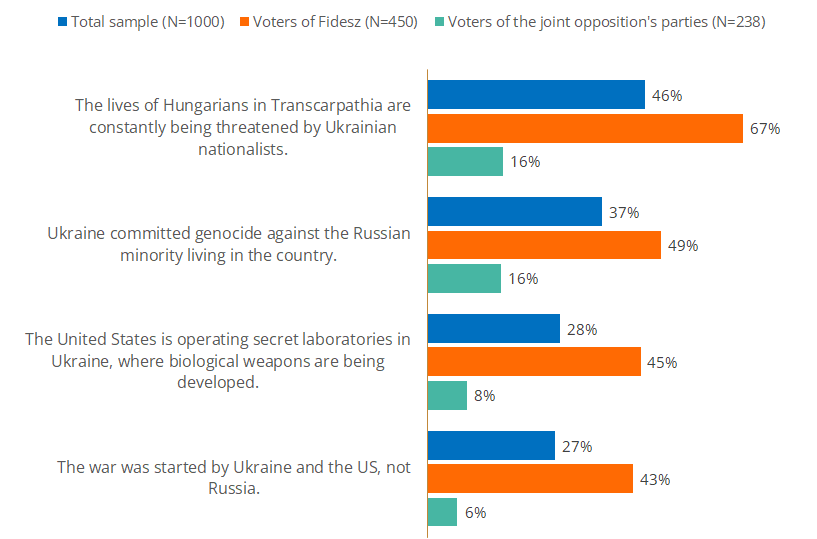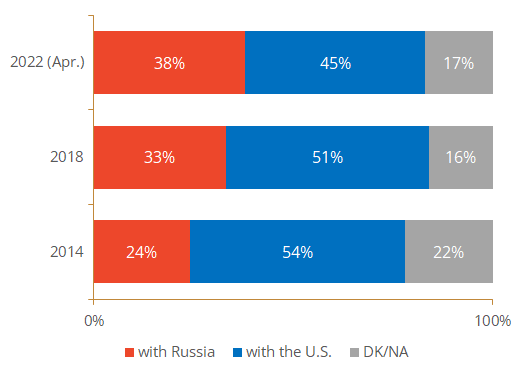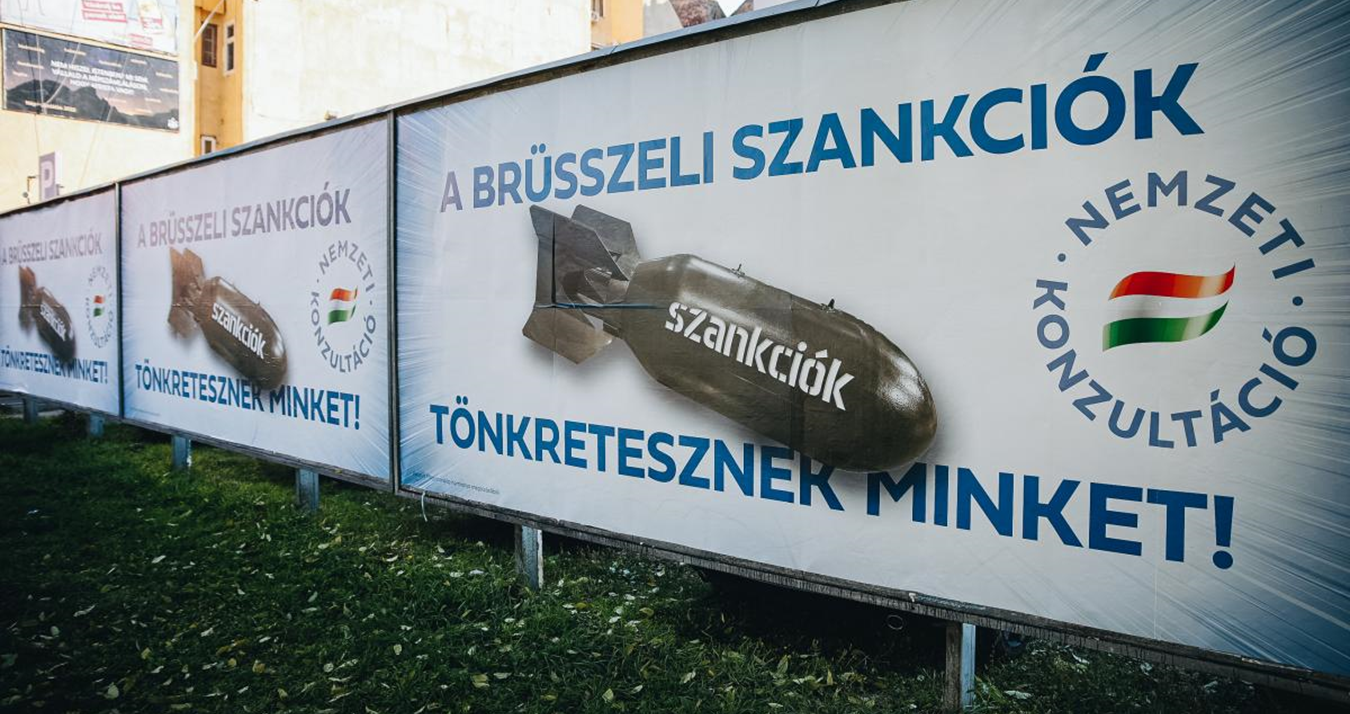Russian influence in Hungary
Dr. Péter Krekó, Director, Political Capital Institute, Senior Fellow, CEPA
Hungary has no significant Russian minority on its territory, no shared language or religious ties with Russia, nor plenty of positive shared historical memories – it is enough to recall Russia's role in smashing Hungarian freedom fights in 1849 and 1956. Still, the influence of the Kremlin is becoming increasingly visible on many fronts in Hungary. It has long-lasting consequences not only on the foreign policy of Hungary, but also on the security of the European Union.
I will talk about four main channels of the present influence of Russia:
1) Energy ties,
2) Economic deals and corrosive capital,
3) Intelligence penetration, and
4) Information influence.
Energy ties
Energy has become the most important source of leverage for Russia on Hungary. The socialist-led governments rather strengthened pragmatic and economic cooperation with Russia between 2002 and 2010. Viktor Orbán and Fidesz were a strong critique of both the Southern Stream project and of the possible Russian extension of the Paks Nuclear power plant project. But once in power, Orbán has become one of the main supporters of these projects.
Despite the experiences of the Russian-Ukrainian gas debate in 2009, when considerable parts of Europe remained without gas, no steps were made to reduce the energy dependence on Russian gas. With more than 60% import of natural gas from Russia in 2021, Hungary was one of the most dependent EU Members(1), and the government is still way more active in securing the gas flow from Russia to Hungary than working on diversification.
The Paks nuclear power plant extension project raises further concerns. This is the only remaining active project of Rosatom after similar project plans have been canceled in Bulgaria, Check Republic, and Finland in the last few years. After the beginning of the Russian invasion, the Hungarian government announced to even speeding up the construction(2). While the implementation is highly uncertain - as the sanctions indirectly halt the construction of the project - the intensifying energy cooperations increase Moscow’s leverage on Hungary. The non-transparent Paks nuclear plant’s construction comes together with a 10 billion euros loan package(3), and Hungary has just agreed with Rosatom to defer winter gas payments amid budgetary constraints(4). We know well that the Kremlin asks the political price of such so-called “gestures”. At the same time, Hungary does not receive a discount price for gas from Gazprom(5), raising further questions about the benefits of this increasing energy dependence.
Economic influence and “corrosive capital”
The overall, quantifiable economic influence of Russia over Hungary is low: Russia is not among the ten most important export or import partners of Hungary6. But there are several projects that are “corrosive” in the sense that they can alter political decisions, due to the economic involvement of high-level decision-makers. Beyond the abovementioned Paks Nuclear Power plant project there have been some other suspicious decisions as well, such as giving a metro reconstruction tender to the Russian Metrovagonmash(7), or favoring the Russian Transmashholding against a Hungarian bidder on an Egyptian energy tender8. As we know from the history of Russian influence operations, these “money traps” can be highly efficient in changing policy outcomes and foreign policy decisions.
The intelligence influence
In the last few years, Hungary has become one of the most vulnerable countries in the EU to Russian intelligence operations. These three examples highlight this tendency:
1) While in other Central and Eastern European countries the size of embassy staff at embassies and consulates of Russia is downgraded (partially by expulsions), the staff of the Russian Embassy in Budapest is on the rise. According to official data, there are currently 56 accredited diplomats working at the Embassy(9), up from 46 a year ago, risking that Budapest is becoming one of the new spy hubs in the European Union. For comparison: on May 31 this year, there were 6 diplomats in Prague, 13 in Warsaw and 3 in Bratislava.
2) The Hungarian government, and parliament, in 2019, in a highly surprising move, decided to invite the Headquarters International Investment Bank to Budapest. This bank is a former Soviet financial instrument turned into an asset of the Russian state in exerting economic influence. While the size of the bank in Hungary is negligible, it has the reputation, and history, of giving loans to projects close to decision-makers. The Hungarian government gave a free, luxurious office place for this bank, and provided high-level immunity to the IIB’s premises, assets, communication, financial activities, staff, officials and their guests, and diplomatic-level immunity for a selected group of key officials, shielding them from any significant domestic or foreign oversight, while making the bank’s internal activities highly opaque. The bank can host an unlimited number of guests according to law, without background checks and with the freedom to move unrestrainedly within the Schengen Area – which is a threat to other EU and NATO member states as well. As other Central Eastern European States, such as Check Republic, Slovakia, Bulgaria, Poland and Romania expressed their commitment to quit the bank, Hungary will become the second biggest shareholder.
3) According to investigative journalists, Russian hackers entered the servers of the Hungarian Foreign Ministry, and stole plenty of information since 2012. Despite the revelations, there was no diplomatic response, and no systemic steps to reduce cyber vulnerabilities. The issue was not raised publicly, or on a bilateral level, and despite this incident, Foreign Minister Szijjártó received the Order of Friendship from Sergey Lavrov in 2021.
Information influence
The most important dimension of Russian influence is in the information domain, which reflects a strong mainstreamization tendency.
Beforehand, the most important target of Russian informational and intelligence influence in Hungary was the extreme right. In Hungary, as in several other countries in the European Union, extreme right parties at the time enjoyed diplomatic, informational, and probably, financial support from the Kremlin. The Jobbik party in Hungary, until about 2014, established very strong ties with Moscow. Its politicians participated in fake election observation missions in the post-Soviet space, including in Luhansk and Donetsk after the Russian invasion in 2014(10). Its former member of the European Parliament, Béla Kovács, has been recently sentenced to five years in prison by the Hungarian courts(11) for espionage to Russia.
But today, the informational influence of Russia is dominant in the mainstream, going directly against the ideological and political traditions of the Hungarian right, and makes Hungary a unique case within the European Union. Viktor Orbán criticized Russia's aggression against Georgia in 2008 and wanted to invite Ukraine and Georgia to NATO in the same year. But since on government, and especially since 2014 we can see an increasing and vocal shift in foreign policy(12), with more and more disagreements and conflicts with Western allies and more and more agreement and collaboration with eastern autocracies, including Russia.
Hungary, with the most centralized media environment in the European Union, has practically become an informational autocracy, where the state can exert influence with the manipulation of information, without the need for using direct violence and oppression. Hungary clearly boasts the most centralized media system in the European Union. According to data from the Mérték Institute from 2019, 79% of the media was concentrated in pro-Fidesz hands(13).
This centralized media environment, combined with a strong pro-Russian official political line from the government, gives an opportunity for the Kremlin to influence the Hungarian public opinion without the need for too much direct investment. The Kremlin-funded Russia Today, even according to Sergey Lavrov’s speech in 2015, planned to open an office in Hungary, with a Hungarian journalist also contracted to lead the office(14). But finally, this plan was abandoned by Russia. The reason might be that the Hungarian state and pro-government media empire are spreading narratives favorable to the Kremlin already, so there is no need for the Russian state to invest in it.
While the analyses of Political Capital could identify pro-Russian troll farms in Hungary, the main line of informational influence in Hungary is different. While Fidesz MEPs have supported most of the resolutions criticizing the Russian invasion during plenary votes, and Hungary has supported eight packages of sanctions already, the domestic narratives are diametrically opposed to the EU- and NATO mainstream.
The mainstream communication paints Ukraine and the West – especially the United States and Brussels-as the main source of danger instead of Russia. Orbán even went as far as naming president of Ukraine, Volodymyr Zelensky as one of his opponents whom he managed to defeat during the election campaign(15).
This campaign clearly had an impact on public opinion: according to topical polls by Eurobarometer, the Hungarian public expresses low sympathy with Ukrainians (the lowest after Bulgaria), and is the least supportive of Ukraine joining NATO. Polls also indicate that Fidesz voters blamed Russia more at the beginning of the invasion, but they increasingly put the blame on Ukraine and the West instead as the conflict progressed(16).
This temporal pattern cannot be attributed to anything other than governmental, and pro-governmental, messaging. Pundits have been pushing conspiracy theories from the Kremlin playbook in the Hungarian state-sponsored media—on the so-called genocide of ethnic Russians in Donbas, on the CIA-led Kyiv junta, on supposed secret American-Ukrainian biolabs, or on the idea that Ukraine, which had given up its nuclear weapons following the collapse of the Soviet Union in the framework of the Budapest Memorandum, was now somehow threatening Russia with developing nuclear weapons(17). In line with this, voters—especially on the governmental side — become supportive of conspiracy theories promoted by Russia as well. For example, as graph 1 shows, 46% of Hungarians agreed that due to Ukrainian nationalists, the life of trans-Carpathian Hungarians is in constant danger, 37% of Hungarians agreed that Ukraine has committed genocide against Russian minorities, and 28% of the voters believed that the US operates secret Biolabs in Ukraine where bioweapons are developed against the Russians, according to Political Capital’s research. The agreement with this statement among Fidesz voters is way higher than the national average(18).

The ruling party’s anti-EU, anti-Western, and pro-Russian rhetoric has clearly had a long-term effect on the population’s foreign-policy orientation, as Graph 2 indicates.

Fidesz has been able to gradually shift the attitudes of its voters in a more pro-Russian, anti-Western direction. While back in 2014, a plurality of Fidesz voters preferred cooperation with the US over Russia, by 2022 this has dramatically changed, with only 24% favoring cooperation with US and 55% with Russia. Fidesz’s anti-Western narrative seems to be making a considerable impact on Hungarian society, although the vast majority of Hungarians still support the country’s EU and NATO membership.
Recently, Hungary have started again a massive billboard campaign in which “Brussels sanctions” are shown as a bomb that is dropped on the Hungarian population. As a result of the deliberately misleading rhetoric, 50 percent of Fidesz voters think that the government has not supported these so-called “Brussels sanctions” according to a recent poll by Political Capital Institute.

The implications
Hungary’s importance lies in its membership in international institutions and Viktor Orbán’s international impact. Orbán's goal is to build a populist, illiberal alliance across Europe and beyond. He serves as a role model for many. Through investments in the local media and economy, Orbán is extending his influence in the broader region. Some of the above-mentioned narratives are widely spread beyond the borders of Hungary as well, as the INGE I Special Committee concluded in its final report. It is true for countries with ethnic Hungarian minority, but also for countries in the Western Balkans through media ownerships, including Slovenia, Serbia, and North Macedonia.
The government’s sympathy towards the Kremlin have not gone unnoticed on the Russian side either. Russian politicians, including Vladimir Putin, Sergey Lavrov and Dmitry Peskov, repeatedly praise Hungary for its outlierism in foreign policy19. And it has an impact on the foreign policy of Hungary as well: as the only EU member state, Hungary obstructed putting Patriarch Kirill on the sanctions list despite his vocal support of the war. Hungary is strengthening ties with the Russian Orthodox church which serves as the extended hand of the Kremlin, GRU, and FSB. Hungary is not supporting the training of Ukraine military personnel (at the same time not blocking it with veto), and currently delaying the ratification of NATO-accession of Sweden and Finland without providing a persuasive explanation.
What should the EU do?
Russia’s strategy of dividing Europe is to focus on member states and find the weakest links. Of course, Hungary is not the only target of this strategy, but there are many others, such as Greece, Austria, Slovakia, Cyprus, Italy, and the list goes on. But Hungary has recently become one of the most successful examples of this influence. It is the common interest of the member states of the EU to counter the increasing Russian influence, in which democratic backsliding comes hand in hand with corrosive capital and a geopolitical reorientation.
Two issues are crucially important to deal with. First: a more coordinated response of European intelligence agencies against Russian infiltration in national, and European institutions. Also, more investment screening is needed, in line with the spirit and wording of the sanctions. Second, steps to keep up the plurality and the integrity of the information space in EU Member states to decrease the (dis)information impact of Russia on the level of Member States. Institutions such as EDMO or EU vs. Disinfo, and legislative plans like the European Media Act are all important20. As not only Russian, but Chinese influence and disinformation operations are becoming more active, more effort is needed in Europe to defend the values of the EU from these external influences that are becoming internal, aiming to destroy the EU from within.
1 Along with Slovakia, Greece, Austria: https://www.statista.com/statistics/1201743/russian-gas-dependence-in-europe-by-country/
2 Governmental promises to eliminate energy dependence from Russia by 2050: https://www.reuters.com/business/energy/hungary-aims-eliminate-reliance-russian-gas-by-2050-minister-2022-10-04/
3 https://www.parlament.hu/irom40/00140/00140.pdf
4 https://www.reuters.com/markets/commodities/hungary-agrees-defer-winter-gas-payments-russias-gazprom-2022-10-03/
5 https://privatbankar.hu/cikkek/makro/nem-olcsobban-dragabban-kapja-magyarorszag-az-orosz-gazt.html
6 These are, by the way, all NATO and/or EU countries, despite attempts of Eastern and Southern opening. https://www.ksh.hu/stadat_files/kkr/hu/kkr0059.html
7 https://vsquare.org/satans-hand-russian-meddling-behind-budapests-metro-chaos/
8 https://444.hu/2018/04/24/egy-magyar-ceg-majdnem-elnyert-egy-nagy-uzletet-aztan-az-orban-kormany-inkabb-beallt-az-orosz-rivalis-moge
9 https://twitter.com/panyiszabolcs/status/1587025159688429568
10 https://eu.boell.org/en/2015/05/05/i-am-eurasian-kremlin-connections-hungarian-far-right
11 https://hungarytoday.hu/former-jobbik-mep-sentenced-for-espionage-for-russia/
12 https://444.hu/2022/03/29/orban-2008-ban-ukrajnat-fel-kell-venni-a-nato-ba-orban-2022-ben-sose-vettunk-reszt-ebben-a-vitaban 13 “Mindent beborít a Fidesz-közeli média,” Mérték Médiaelemző Műhely, April 25, 2019, https://mertek.eu/2019/04/25/mindent-beborit-a-fidesz-kozeli-media/.
14 https://atlatszo.hu/kozpenz/2017/09/26/juszt-laszlo-majdnem-a-russia-today-magyar-arca-lett/
15 https://miniszterelnok.hu/orban-viktor-beszede-a-fidesz-kdnp-valasztasi-gyozelmet-kovetoen-2/
16 https://444.hu/2022/05/10/jobban-kedvelik-a-fideszesek-putyint-mint-a-nyugati-vezetoket 17 Dávid Sajó, “Magyarországon is óriási erőkkel terjeszti a Kreml a háborús propagandát,” Telex.hu, March 3, 2022, https://telex.hu/belfold/2022/03/03/kormanykozeli-segitseggel-terjeszti-a-kreml-magyarorszagon-a-haborus-propagandat
17 Dávid Sajó, “Magyarországon is óriási erőkkel terjeszti a Kreml a háborús propagandát,” Telex.hu, March 3, 2022, https://telex.hu/belfold/2022/03/03/kormanykozeli-segitseggel-terjeszti-a-kreml-magyarorszagon-a-haborus-propagandat
18 https://telex.hu/belfold/2022/06/29/oroszbaratsag-oltasellenesseg-kutatas-political-capital
19 https://dailynewshungary.com/russia-praised-the-hungarian-government/
20 Political Capital is part of the consortium that is responsible for the national EDMO Hub in the framework of the Lakmusz2 consortium together with Magyar Jeti Zrt., AFP, Mérték Media Monitor and Idea Foundation.

